Woke Watch Canada is a reader-supported publication. Please consider becoming a paying subscriber or making a one-time or recurring donation to show your support.
(This essay originally appeared on July 28th in the pages of the C2C Journal)
By
Annie Ohana is an acclaimed educator at L.A. Matheson Secondary School in Surrey, B.C. Among the accolades that have come her way in recent years was becoming a 2023 finalist for what some bill as the “Nobel Prize for educators”: the Global Teacher Prize, awarded at the 42nd UNESCO General Conference last November. That sounds admirable indeed. Surely, the parents of one of her pupils – or anyone else reading of the award – would think, this meant Ohana proved tops at imparting the intricacies of algebra, or conveying her love of literary classics, or perhaps explaining how Einstein’s theory of relativity affected Newtonian physics.
Not exactly. Ohana is an “anti-oppression and equity curriculum specialist” who appears happiest focusing on “social justice” issues. In fact, judging by her social media posts, she can hardly even spell. Several months ago, images from the inside of Ohana’s classroom came to light, revealing her classroom clutter and pedagogical approach to have a transparently far-left political bias involving deliberate attempts to engage her students in social justice activism. Legacy media like CTV News and others portrayed the resulting public concern and pushback as bullying and attacks against Ohana. The National Post’s Jamie Sarkonak, however, pointed out the following about Ohana’s classroom: “There’s a Palestinian flag, but no Israel flag is visible. There are progress pride flags but no thin blue line flag. There are denunciations of colonialism but no posters honouring Sir John A. Macdonald or Queen Elizabeth II. There’s a Canadian flag – over which the text, ‘No pride in genocide’, is printed.”
Ohana’s own public utterances leave little doubt where she stands. The following is taken from an X post by Ohana last September, transcribed exactly as it appeared: “The Republican Psrty is are rooted in exclusionaty White Supremacist brliefs. Their token measures will never be enough or make any kind of sense. They just want to exploit identity to push forward hate fillrd policies.” Parents (or taxpayers) mystified that young Canadians graduate from high school unable to write coherently need wonder no more. This link shows four examples from Ohana’s classroom, posted to Twitter in August 2021 (and reproduced in the accompanying illustration).

Ohana is, unfortunately, far from unique in her approach. Teacher training programs, such as the kind offered at the University of Toronto’s Ontario Institute for Studies in Education (OISE), have been tilting toward left-of-liberal identity politics for years. OISE’s influence can be seen (and felt) nationally. It is considered a world leader in education and education research, this year ranked the 8th best educational institution in the world by QS World University Rankings by Subject. (QS stands for Quacquarelli Symonds, which bills itself as a “higher education analytics firm”.) That was no exception for OISE; it was ranked seventh in 2023, fourth in 2022 and third in 2021. Last year, OISE was also ranked ninth globally by the Times Higher Education World University Rankings, and in 2022 ShanghaiRanking (yet another university assessment consultancy) placed OISE tenth in the world.

The OISE is a full-throated practitioner and advocate of critical social justice theory for education. At its simplest – and like its cousins in other fields, such as critical race theory – critical theory is a neo-Marxist method of analyzing society which attempts to reveal, critique and challenge its power structures, which are presumed to be oppressive, unequal and unjust. Critical theory is thus a negatively skewed radical critique of opposition to the foundational institutions of Western society, such as liberalism, the free-market economy (or capitalism), the Western Canon of literature and art, Christianity, the nuclear family, and so on.
The Emergence of Critical Pedagogy
One of critical theory’s important offshoots is what became known as critical pedagogy. Brazilian Marxist educator Paulo Freire is often cited as its branch’s founder. In his influential 1970 book, Pedagogy of the Oppressed, which sold over 1 million copies, Freire proclaimed that, “The more students work at storing the deposits entrusted to them, the less they develop the critical consciousness which would result from their intervention in the world as transformers of that world.” The job of children, then, is no longer to absorb knowledge and wisdom accumulated through the ages, but to upend the civilization bequeathed to them.
Pedagogy of the Oppressed’s central premises are to apply a Marxist oppressor/oppressed framework to education – with teachers and pupils placed in the respective roles – and then to set about dismantling and recasting the hierarchy. This turns the school into a site of struggle and indoctrination, utilizing children as a means for transforming society at large over the longer term. The student-centred emphasis (in contrast to the conventional teacher-centric or top-down approach) is facilitated by the flattened, no-longer-hierarchical relationship between students and teachers.
Freire wasn’t solely responsible for all this, of course; nor did he invent the concept of “child-centred” learning. The progressive movement’s subversion of education started much earlier, going back at least to widely acclaimed early 20th century American philosopher John Dewey. In Freire’s era, other social trends were also at work and influential. Isaac Gottesman, a leftist academic and historian of critical social justice, documented this process in The Critical Turn in Education: From Marxist Critique to Poststructuralist Feminism to Critical Theories of Race, published in 2016.
Gottesman showed how radical activism migrated to the classroom in the aftermath of the disintegration of the 1960s-era New Left. As he put it, “After the fall of the New Left arose a new left, an academic left.” Though often considered a new trend, it was actually the result of a long process that had gradually transformed the general state of education to one thoroughly imbued with critical theory, expressed through the adjacent critical social justice, and taught through Freirian critical pedagogy.

The influential Canadian critical theorist Henry Giroux may be most responsible for championing Freire’s critical pedagogy approach in Canada. The now-80-year-old Giroux was known for criticizing the “market-driven logic of neoliberal capitalism” and claimed that as a consequence, there was “little interest in both public and higher education, and most importantly in many schools of education, for understanding pedagogy as a deeply civic, political and moral practice – that is, pedagogy as a practice for freedom.” Of course, Giroux’s understanding of “freedom” was not freedom as regular citizens of Western democracies understand it, but revolutionary/Marxist in nature.
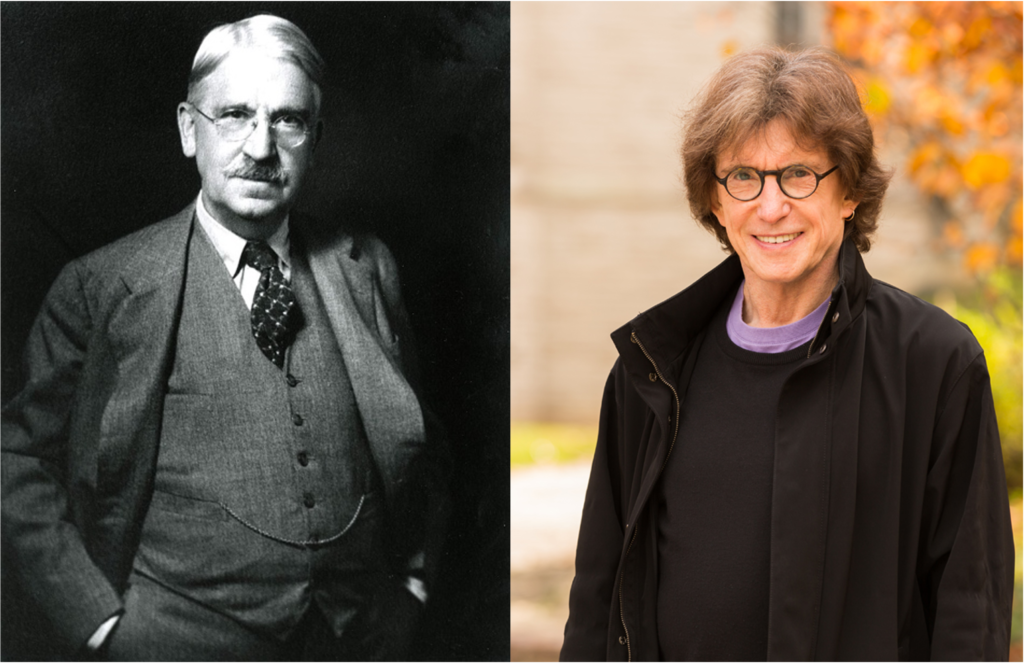
Though long in coming, the theoretical foundations of critical pedagogy and other branches of critical theory were clearly well-laid, because institutions in many Western countries have become thoroughly infected with it. Some critics of critical pedagogy ascribe much of the turn in Canadian education to Giroux’s influence, as well as newer developments such as the Paulo and Nita Freire International Centre for the Study of Critical Pedagogy at McGill University in Montreal, which is dedicated to what it calls a “second phase” in which “critical pedagogy seeks to become a worldwide, decolonizing movement.”
How Critical Pedagogy is Spread across Canada
The OISE and its staff certainly also appear imbued with critical theory and critical pedagogy – as well as the full panoply of left-wing or “progressive” ideas. As the OISE’s website immediately makes clear, it promotes programs and lauds professors pursuing things like “climate responsive school gardening” and “Black/African Feminism”. This clear ideological tilt means that for someone wishing to make an academic case against the new paradigm, anonymity is often necessary to avoid the ramifications of critical theory’s enforcement mechanism: cancel culture.
In an email exchange with a Toronto-based academic (PhD in History) who publishes his research under the pseudonym Mr. M, I asked for his take on the OISE’s influence and why it should matter to the rest of Canada. “In educational studies, there is a clear understanding that radical pedagogy is in an ascendant position, with the potential to eclipse traditional liberal teaching,” wrote Mr. M. “Indeed, the fact that this educational transfiguration has already occurred, and has been occurring for generations, is a matter of consensus for education theorists across political aisles.”
As a well-funded and respected facility whose role is to train the trainers – educating the educators of tomorrow – the OISE can be regarded as central to that process in Canada. Its programs are exclusively for those seeking higher-level education degrees – MA, MeD, and PhD – and who may become teachers or go on to become leaders in the field such as education theorists and/or radical pedagogists. The OISE is not the only place to get such an education in Canada, but it is the most prestigious and trend-setting. As Mr. M explains, “OISE creates the curriculum and the value system which tomorrow’s educators and education theorists will propagate throughout the nation and, to some extent, the trends which other education institutions will follow.”

The OISE’s leftward slide has hinged on the adoption of critical pedagogy, which centres and promotes social justice activism in the classroom. The influence of the methods and theories that the OISE promotes means that K-12 education in Canada is shifting its focus away from the acquisition of knowledge and skills to training students to develop their “critical consciousness”, presented as social justice or anti-oppression education.
(As a relevant digression, the sustained and often vicious resistance against Alberta’s UCP government’s years-long attempt to implement a new, fact-based K-6 school curriculum can be regarded as critical pedagogy’s recognition that the draft curriculum represents a fundamental rejection of critical theory and the Marxist narrative in education and, accordingly, must be stopped before it spreads.)
A search through the course titles listed on the OISE’s online course directory, with an eye out for terms that signal the presence of Marxist theory, like “critical” and “praxis”, is revealing. The organization’s Teaching and Learning Department offers the following courses, among others: Critical Practitioner Research in Education; Critical Pedagogy, Language and Cultural Diversity; Critical Approaches to Arts-Based Research; Exploring the Praxis of Environmental & Sustainability Education; Critical Literacy in Action; and Critical Perspectives on Language, Racism, and Settler-Colonialism. There is vastly more in this vein; the website’s search engine disgorges dozens upon dozens of courses using familiar left-wing buzzwords, ranging from teaching “Sexual Diversity” to “Gendered Colonialism” in history. By contrast, the search engine produces just one teaching course offered on each of Physics, Biology and Chemistry.
The Critics – and Casualties – of Critical Pedagogy
Stephen Reich is a Toronto-based researcher and currently a doctoral student at OISE who answered a few of my questions about critical theory. Reich is unique in his willingness and desire to openly take on critical theory at the nation’s leading research and educational institute advancing that very theory. And by maintaining a light and humorous tone amidst the OISE’s hostile waters, he is getting away with it – so far.
Reich’s Master’s thesis, published this year, is entitled Does Ontario’s Ministry of Education Promote Critical Theory in K-12 Education? It is a rigorous, well-written and researched academic paper that was “submitted in conformity with the requirements for the degree of a Master of Arts” at the University of Toronto, and it makes the case that critical pedagogy/critical theory are flawed and impractical approaches that are ill-suited to Canadian education. Reich says he has yet to find any evidence of critical or social justice theory’s efficacy in Canadian schools and, on the contrary, has concluded that their negatives in K-12 education far outweigh any possible benefits in contributing to social justice. Reich considers not merely their content but their theoretical structure fatally flawed.
“If you can’t set out the attainable goals of an educational theory, methodically operationalize it, and then measure whether it accomplishes the goals you set out, then the academic theory isn’t worth the paper it’s written on (or the energy used to digitally produce it),” Reich says. “Critical pedagogy offers teachers no attainable goals, no way to operationalize it in a multicultural classroom of 30 children, and no means to measure its success.” It may be fine as “an intellectual exercise to critique society from the rarified air of the ivory tower.” But only that. Reich’s conclusion: “It has no place in the classrooms of our country.”
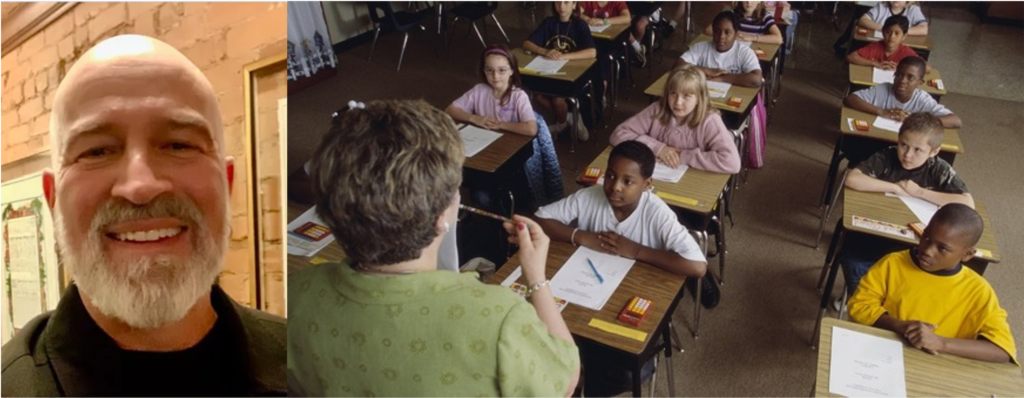
Despite the presence of critics like Reich and Mr. M, Canada’s critical theory train is now a rumbling wokist behemoth, and teachers from coast to coast are getting the message: embrace and celebrate the new way of teaching, or at least fall into line and shut up – or else. Teachers are already being sanctioned for failing to meet the demands of critical consciousness or the expectations of social justice activism.
Last year, for example, Jim McMurtry, a teacher from Abbotsford, B.C., was fired for discussing Indian Residential Schools outside of the critical framework, which favours the interests (and feelings) of visible minorities and gender non-conforming identities over evidence, facts and objective truth. McMurtry, who has a PhD in Education and Indigenous History, plus 40 years of teaching experience, was ousted for relaying historically accurate and factual information, in this instance that Indigenous children died of tuberculosis and other diseases rather than being murdered by teachers, priests or nuns. Two years before McMurtry, Cheryl Gould, another teacher with a glowing record, was fired from her Catholic school in Toronto for satirically critiquing diversity, equity and inclusion, gender ideology and critical race theory on her own time on social media.
The Destruction of Liberal Education
Among the social justice paradigm’s underlying premises is that the activism (praxis) of critical social justice liberates the mind from false consciousness (being ignorant of oppression). Anyone who disagrees that Canada is rampant with social injustice is simply said to have false consciousness.
One of the main ways of demonstrating proper critical consciousness is to elevate, centre and favour the needs and interests of those deemed historically marginalized. To “centre” is to correct an apprehended inequity; to push in the opposite direction is to “de-centre”. Because critical theorists claim Western or “Euro-centric” society leads to social injustice, they must de-centre and dismantle the Euro-centric traditions found throughout Western institutions – including education – and centre cultural traditions and ways of understanding that come from groups deemed “equity-deserving”.
Much of the emphasis on identity seems to be about identifying, by appearance, marginalized groups. And by extension, identifying those responsible for marginalizing them. This is how social justice activists understand multiculturalism: the decentring of whiteness. People, evidently, like McMurtry and Gould.
The field of education’s shift from the Enlightenment-era liberal promise of individual liberation through knowledge to a radical revolutionary conception of liberation which can only come about through transformative – read: destructive – Marxian politics has been a slow, gradual, “long march through the institutions”, as American essayist Roger Kimball and others have described the left’s campaign. But it is all-but complete: from kindergarten onward, kids are now taught to interpret the world through a radical political lens and to identify and fight against hidden identity-based structures of oppression as defined by activist-teachers. Although not always apparent, the working assumption of critical theory is that Canadian freedoms – or more broadly, our nation’s historically pluralistic, tolerant and open-minded ways of doing things – are instead responsible for the reproduction of these structures of oppression and for the maintenance of a socially unjust status quo.
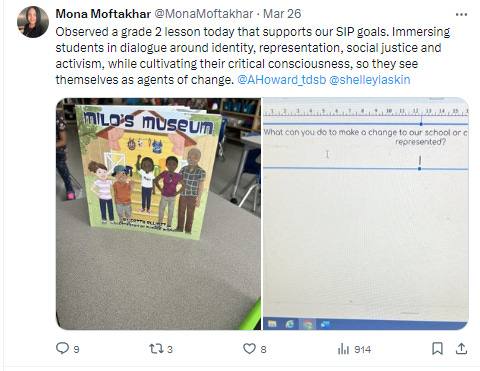
Mona Moftakhar, according to her X profile, is a Toronto District School Board “Vice Principal/Former Special Education Inclusion Consultant” and an “Equity-Centred Educator.” The accompanying images are examples of her posts taken from X. In the first, Moftkahar posts about immersing Grade 2 students “in dialogue around identity, representation, social justice and activism, while cultivating their critical consciousness, so they see themselves as agents of change.” In other words, as Freire’s transformers of the world.
Another example is in the accompanying images, where Grade 3 students at the Peel District School Board (which encompasses the western portions of greater Toronto) are asked, “What does the word privilege mean?” Two examples of apparent student responses hung on the classroom walls are telling. The first one reads: “privlege (sic) means when something is easier like white People have more privlege (sic) than black (sic)” The other child’s sentiment is similar: “Privilege Means When someone is easyer (sic) for someone else for exempal (sic) someone is white (sic)” The kids can barely spell and are unable to assemble a simple sentence, yet educators are already indoctrinating eight-year-olds with esoteric facets and identitarian complexities found in critical theory.
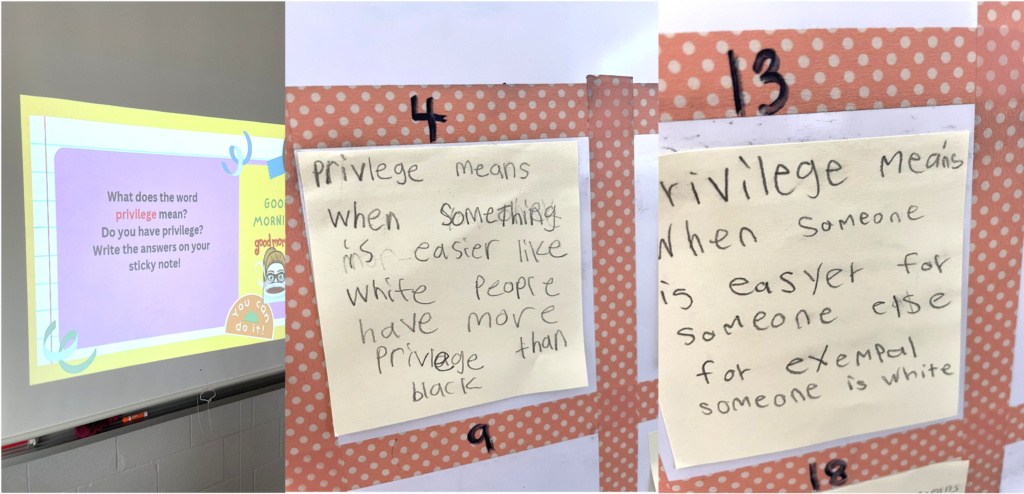
The word “liberal” in liberal education once referred to the liberty the individual can access by acquiring knowledge through an education in the traditional liberal arts of grammar, logic, rhetoric, geometry, arithmetic, astronomy and music. By gaining a grounding in the Western Canon of knowledge and learning how to seek after the truth – the real, empirical truth – the student achieves intellectual freedom plus the freedom to become a functioning adult and responsible citizen. While the latter stages of this process typically take place in university, the foundation is laid during a child’s schooling.
Schoolchildren today, however, are learning a different version of liberty. They are learning about “anti-oppression” and radical “liberation”, which involves the development of Freirian critical consciousness and becoming activists advancing an approved ideology. An adjacent and underlying assumption, based on the existence of inequitable outcomes between identity groups, is that Canadian education itself is oppressive; Marxist logic, of course, requires the oppressors’ yoke to be thrown off.
The Need to Refocus on Top-Quality Schooling for Kids

When one considers that curriculums are standardized for students, and that attendance is mandatory, and schools are free of charge, does that not place all children at basically the same starting line? Then why are only some oppressed? Not all students live in the same proximity to schools or public libraries, or have parents willing to help them with homework. A longer commute to school cuts in on valuable homework time. Does this mean such a child is oppressed, or one with a single parent who cannot spend the same amount of time helping with homework as is typical of two-parent families? Isn’t it unfair to associate children of two-parent homes with oppressors? Is the kid’s house located across the street from the school a castle of oppression?
Nor does every young student have an equal aptitude or equal desire to learn and acquire the same intellectual skills. There are too many variables involved to assume a general climate of oppression, and then cast blame on groups historically deemed to be successful – as if there are no white or “white-adjacent” kids who also struggle with education and in other socio-economic domains.
This critical turn means that students are being taught in a way entirely divorced from the promises of a traditional liberal arts education: maturation, self-improvement and, ultimately, self-actualization. Under the critical pedagogy conception, students have no agency or power to liberate themselves as individuals, only a singular choice to engage in the power struggles of identity politics, where privilege is the hinge on which race, sex and gender identity oppression swings. As American political scientist David Corey recently argued, Freire’s critical pedagogy “frustrate[s] the ultimate goal of liberating students as human beings – as people capable of thinking for themselves.” Corey’s article fittingly renamed Freire’s doctrine “oppressive pedagogy”.
Chanel Pfahl is a former teacher from Ontario turned education critic, after being put under investigation by the Ontario College of Teachers (OCT) for criticizing critical race theory in 2021. The trouble began in February of that year when a teacher in a private Facebook group asked Pfahl and others to share Black Lives Matter resources to use in class. She posted the following comment in response: “Kids aren’t in school to be indoctrinated with Critical Race Theory. Schools should be non-partisan. Focus on modeling kindness to everyone and speak out against any form of discrimination you see. This includes the discrimination brought on by antiracist movements (i.e. all white people are racist, etc.). In some places (ex Britain), it is now illegal to teach CRT without offering a balanced opposing view.”
Pfahl’s pointed though measured post triggered complaints and a lengthy disciplinary process. Although the OCT eventually decided Pfahl would keep her teaching licence, the proliferation of critical theory in Canada’s schools and personal health-related factors caused Pfahl to bow out of teaching. Today she is an independent journalist dedicated largely to exposing woke teaching practices in Canadian schools by posting classroom images and materials to X – such as the accompanying images.

Pfahl’s kinds of experiences are becoming increasingly common. With all of the social justice distractions and critical consciousness-raising in the classroom, it does not appear that enough time and resources are being dedicated to what is most important: providing kids with a top-quality schooling that covers timeless core subjects like mathematics and English, as well as modern-day skills like financial literacy and using computers. Without solid grounding in the fundamentals, something traditional liberal arts and sciences education has imparted to students with great success for centuries, how can we expect students to thrive in a complicated, ever-evolving world?
And what will our future Canadian society look like when everyone has been divided by identity and taught to view each other through the prism of privilege? It is high time for parents, students and concerned citizens to demand some accountability from the education leaders who push critical pedagogy and its related social justice theories, and the political leaders who refuse to push back against this radical movement.
James Pew is the publisher of Woke Watch Canada, a contributing author of the best-selling book Grave Error: How the Media Misled Us (and the Truth about Residential Schools), and a contributing writer to several Canadian journals and independent media.
Thanks for reading. For more from this author, read Gender Affirming Care For Minors in Canada
Follow Woke Watch Canada on X - @WokeWatchCanada
Or, by contributing to our Donor Box:






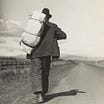
https://oneclickpolitics.global.ssl.fastly.net/promo/602 please use this link to instantly write all senators on the totalitarian power grab of bill c293
An excellent and informative article clearly demonstrating the viral nature of infectious stupidity transmitted thru the vehicle of education by cognitively impaired adults.
"...I am afraid that education is conceived more in terms of indoctrination by most school officials than in terms of enlightenment. My own belief is that education must be subversive if it is to be meaningful. By this I mean that it must challenge all the things we take for granted, examine all accepted assumptions, tamper with every sacred cow, and instill a desire to question and doubt. Without this the mere instruction to memorize data is empty. The attempt to enforce conventional mediocrity on the young is criminal." ~ Bertrand Russell